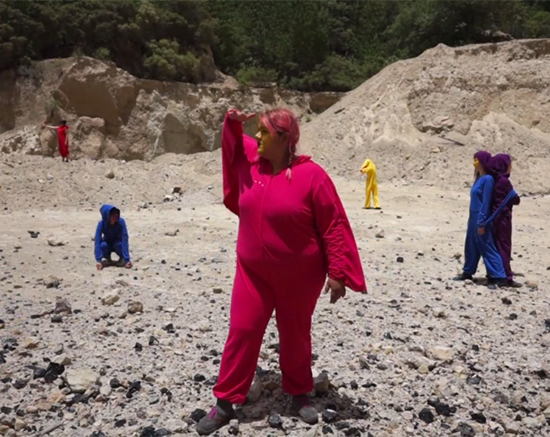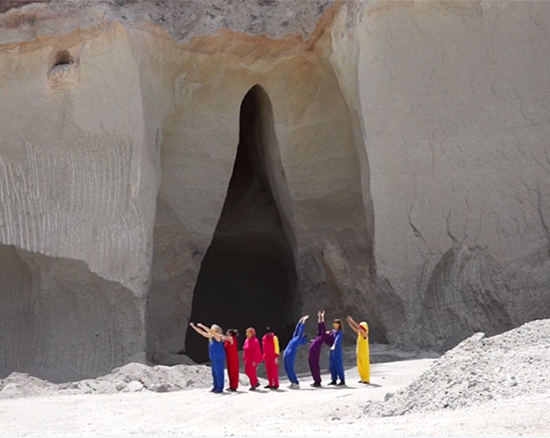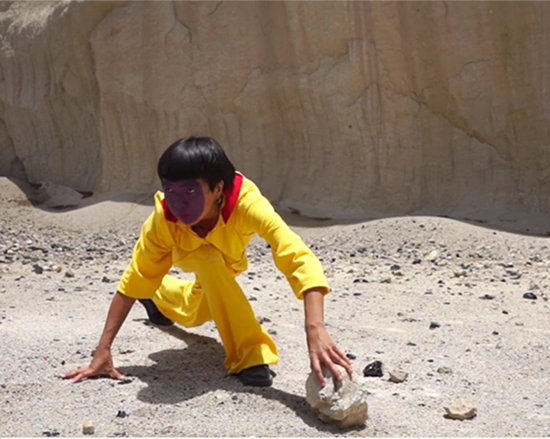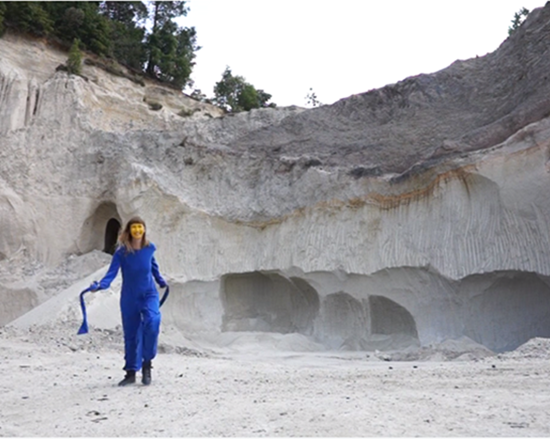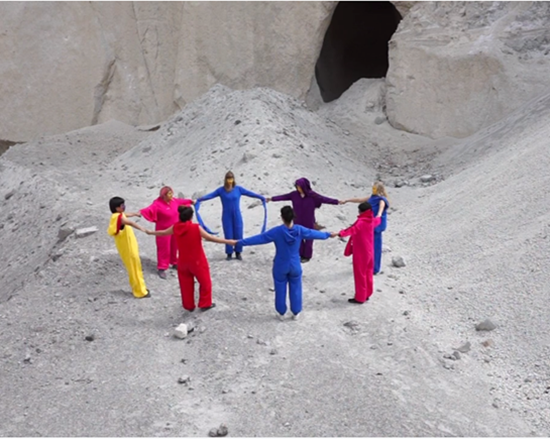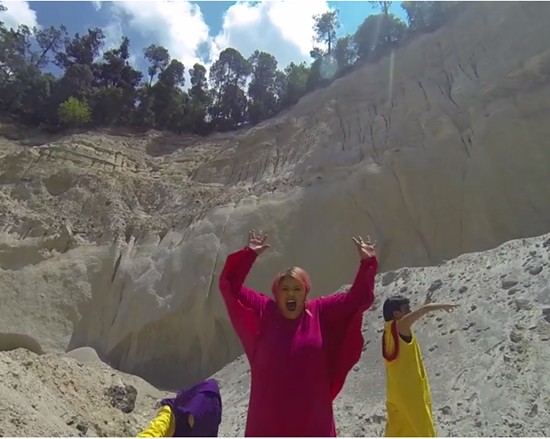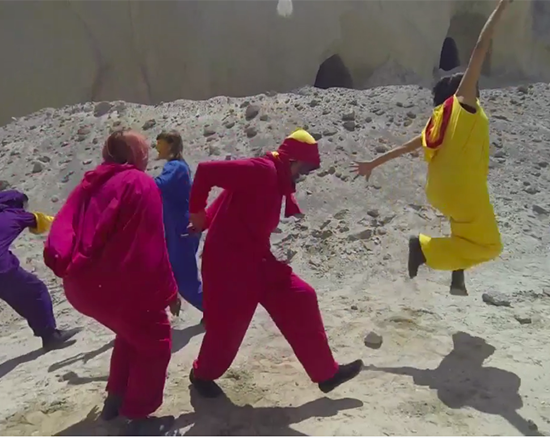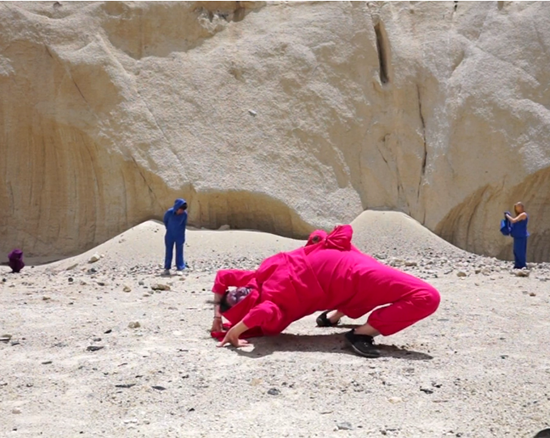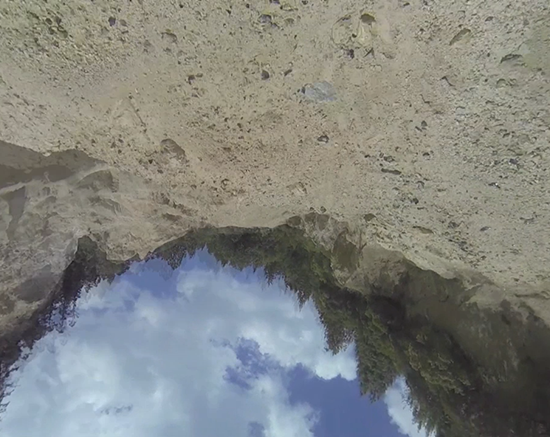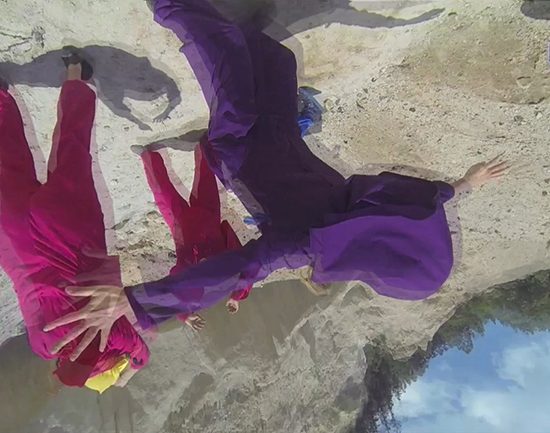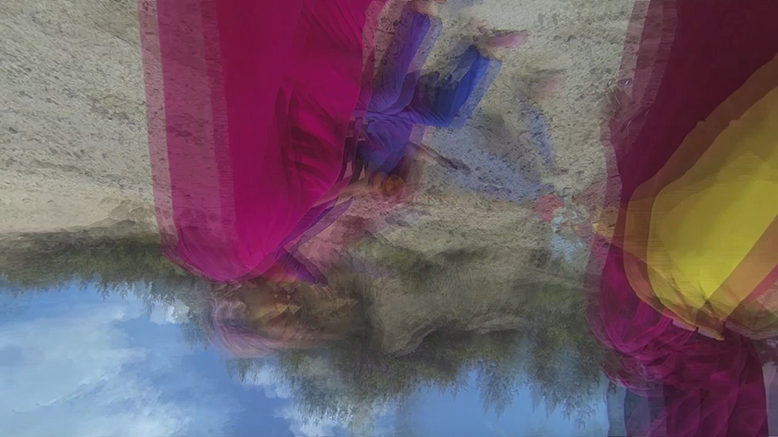
Nadie Aquí es Ilegal
INVASORIX
INVASORIX is a feminist/queer working group that produces publications, performances, songs, and videos to imagine alternative ways of inhabiting the planet and relating to each other. In their projects, they are committed to collaboration and solidarity as a way of facing the current state of things in society. Here No One Is Illegal invites us to imagine other possible worlds. Recorded in Cerro de las Navajas de Nopalillo in Hidalgo, Mexico, the video captures a series of individual and collective movements, carried out by the members of the group, to the rhythm of the song that gives the video its name. Calling for desire, pleasure, and freedom, the video shows the play of bodies that coexist, interact and support each other by executing push-ups, pirouettes and various other movements. The ethereal music and the landscape, in combination with the colorful costumes, give the work a spatial, extraterrestrial quality. The video calls for the care and recognition of the dignity of all the people on the “(she) planet,” as the group calls it. The lyrics of the song advocate listening and respect for others, and point out that no one is illegal here, no one is normal, and that pleasure must be shared to fight. Against the background of the control exerted by capitalism, the rules of hetero-patriarchal society, the violence and racism that prevail today, as well as the great environmental crisis of our days, INVASORIX reminds us with humor and a strong, playful spirit that another world is possible—a horizontal world, which fits all the bodies and universes of all the people on the planet. This call takes on great force and becomes more urgent and necessary today than ever.
INVASORIX is a working group interested in songs and music videos as a form of queer-feminist protest, composed of eight women artists who are between 25 and 36 years old and live and work in Mexico City: Daria Chernysheva, Waysatta Fernández, Nina Hoechtl, Maj Britt Jensen, Natalia Magdaleno López, Liz Misterio, Naomi Rincón-Gallardo and Mirna Roldán. Since Spring 2013 they have met regularly to collectively write songs and make videos that are based on their experiences: on precarity and on power dynamics in their environments, among others.
The Futures are Here by Invasorix
Esteban King Álvarez (México City, 1986) is researcher, art historian and curator. He holds a BA in History and a MA in Art History from the National Autonomous University of Mexico (UNAM). His work focuses on modern and contemporary art and its relationships with music and literature. He has developed projects that interwove sound, archive and writing from the perspective of art history and contemporary art. He has written severalarticles in books and art catalogues, among others: “Strindentism and Urban Imaginaries” for the catalogue Avant-garde in Mexico, 1915-1940 (National Museum of Art, 2013); “New narrative strategies: the works of Salvador Elizondo” for the catalogue Defying stability: artistic processes in Mexico, 1952-1967 (MUAC, 2014) and “Sonorama. Art and technology from hi-fi to MP3” for the catalogue Sonorama (Museo Universitario del Chopo, 2014). He is curator of the collective exhibitions Transcripciones (Museo Universitario del Chopo, 2014), Una red de líneas que se intersecan (ESPAC, 2016) and La nueva onda del silencio (El cuarto de máquinas, 2017), among many others. From 2012 to 2015 he was curator and chief researcher at the Museo Universitario del Chopo, and from 2015 to 2019 curator and editor at ESPAC, Espacio de Arte Contemporáneo. He’s currently studying a PHD on Art History at UNAM, is part of the curatorial team of the XIV Bienal FEMSAInestimable Azarand works as a freelance writer.
Notes for Tomorrow is a traveling exhibition organized and produced by Independent Curators International (ICI) and initiated by Frances Wu Giarratano, Jordan Jones, Becky Nahom, Renaud Proch, and Monica Terrero. The exhibition was made possible with the generous support of the Andy Warhol Foundation for the Visual Arts, VIA Art Fund and ICI’s Board of Trustees and International Forum.![]()
![]()
![]()
We are on Treaty 1 Territory. Plug In ICA is located on the territories of the Anishinaabeg, Cree, Oji-Cree, Dakota, and Dene peoples, and the homeland of the Métis Nation. Our water is sourced from Shoal Lake 40 First Nation.
Plug In ICA extends our heartfelt gratitude to our generous donors, valued members, and dedicated volunteers. We acknowledge the sustaining support of our Director’s Circle. You all make a difference.
We gratefully acknowledge the support of the Canada Council, the Manitoba Arts Council and Winnipeg Arts Council. We could not operate without their continued financial investment and lobbying efforts.
Plug In ICA relies on community support to remain free and accessible to all, and enable us to continue to present excellent programs. Please consider becoming a member of Plug In ICA and a donor at https://plugin.org/support or by contacting Erin at erin@plugin.org.
For more information on public programming and exhibitions contact Allison Yearwood at allison@plugin.org.
For general information, please contact: info@plugin.org or call 1.204.942.1043



